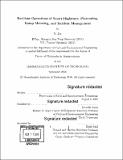| dc.contributor.advisor | Saurabh Amin. | en_US |
| dc.contributor.author | Jin, Li, Ph. D. Massachusetts Institute of Technology | en_US |
| dc.contributor.other | Massachusetts Institute of Technology. Department of Civil and Environmental Engineering. | en_US |
| dc.date.accessioned | 2019-03-01T19:53:48Z | |
| dc.date.available | 2019-03-01T19:53:48Z | |
| dc.date.copyright | 2018 | en_US |
| dc.date.issued | 2018 | en_US |
| dc.identifier.uri | http://hdl.handle.net/1721.1/120635 | |
| dc.description | Thesis: Ph. D. in Transportation, Massachusetts Institute of Technology, Department of Civil and Environmental Engineering, 2018. | en_US |
| dc.description | Cataloged from PDF version of thesis. | en_US |
| dc.description | Includes bibliographical references (pages 185-194). | en_US |
| dc.description.abstract | Highway systems have witnessed a significant modernization in recent years due to the deployment of traffic sensing and control capabilities. In addition, the ongoing developments in connected and autonomous vehicle technology are poised to enable advanced capabilities such as platooning and vehicle-to-infrastructure communications. On one hand, these advancements offer new opportunities for improving the operational efficiency of highway systems. On the other hand, most highway system operators still face significant challenges in ensuring adequate performance under disruptions such as incidents and other capacity-reducing events, as well as demand fluctuations. Furthermore, the inherent vulnerabilities of cyber-physical components in smart highway systems are prone to exploitation by adversarial agents, who can introduce strategic disruptions. Thus, ensuring the resiliency of highway operations is a principal concern of system operators. In this thesis, we contribute to the above-mentioned challenge by developing a system-theoretic approach for maintaining resilient highway operations under a broad range of disruptions, modeled as stochastic perturbations in highway capacity or traffic demand. In particular, we focus on three types of highway operations: vehicle platooning, ramp metering, and capacity-aware routing/demand management. Our approach relies on (i) modeling partially automated traffic flow dynamics under disruptions as stochastically switching dynamical systems, (ii) analyzing their long-time properties (stability and/or convergence), and (iii) designing traffic control schemes that improve system throughput with stability guarantees. We demonstrate the application of our approach to several realistic situations ranging from capacity perturbations at incident hotspots to moving bottlenecks created by heavy-duty vehicles to stochastic arrivals/progression of autonomous vehicle platoons. To model traffic flow dynamics under disruptions, we extend classical macroscopic traffic flow/queuing models by combining them with Markovian switches in flow/queuing dynamics that capture the stochasticity in occurrence/clearance of disruptions. Specifically, we propose two models: Piecewise-Deterministic Queuing (PDQ) model, and Stochastic Switching Cell Transmission Model (SS-CTM). The PDQ model is the most basic model that captures the dynamic evolution of a traffic queue upstream of a highway bottleneck under perturbations in capacity or demand. We use this model to analyze link-level capacity management schemes and design capacity-aware routing schemes for parallel-route highway systems. The SS-CTM captures the spatial propagation of a disturbance created by capacity perturbations, and is useful for identifying the congestion bottlenecks induced by these perturbations. We adopt this model to analyze the impact of perturbations on the on-ramp queues and highway throughput as well as to design new ramp control schemes with improved performance guarantees. Our results on the stability analysis of PDQ and SS-CTM utilize more general results on the stability of continuous-time Markov processes. We refine them for the purpose of evaluating the boundedness of traffic queues upstream of highway bottlenecks and on the ramps. Our key contribution is a computationally tractable approach for verifying the classical Foster-Lyapunov drift condition over a finite subset of states, which happen to be the vertices of an invariant set for the stochastic traffic dynamics. This requires us to exploit the long-time properties of the PDQ and SS-CTM-in particular, the cooperativity of traffic flow dynamics and ergodicity of Markov chain that models disruptions. Our analysis approach enables us to estimate how performance metrics such as throughput and travel time change with location and intensity (rate) of disruptions. We also extend our results to the problem of designing traffic control schemes that improve system throughput under perturbations, while maintaining stable traffic queues. This leads us to identify somewhat surprising ways to prioritize and route traffic on real-world highway systems, and relate them to important operational capabilities such as lane control on automated highways, speed regulation of platoons, incident-aware routing, and stabilization of on-ramp queues. Finally, we also consider the modeling and impact evaluation of security disruptions. We report an initial game-theoretic model that captures an emerging security concern in multi-priority highway systems. The model is relevant to study the incentives of strategic misbehavior by individual vehicles who can exploit the security vulnerabilities in vehicle-to-infrastructure communications and impact the highway operations. We also discuss strategic response to cyber-physical attacks on smart highway infrastructure for timely recovery of compromised traffic links. | en_US |
| dc.description.statementofresponsibility | by Li Jin. | en_US |
| dc.format.extent | 194 pages | en_US |
| dc.language.iso | eng | en_US |
| dc.publisher | Massachusetts Institute of Technology | en_US |
| dc.rights | MIT theses are protected by copyright. They may be viewed, downloaded, or printed from this source but further reproduction or distribution in any format is prohibited without written permission. | en_US |
| dc.rights.uri | http://dspace.mit.edu/handle/1721.1/7582 | en_US |
| dc.subject | Civil and Environmental Engineering. | en_US |
| dc.title | Resilient operations of smart highways : platooning, ramp metering, and incident management | en_US |
| dc.type | Thesis | en_US |
| dc.description.degree | Ph. D. in Transportation | en_US |
| dc.contributor.department | Massachusetts Institute of Technology. Department of Civil and Environmental Engineering | |
| dc.identifier.oclc | 1087498782 | en_US |
